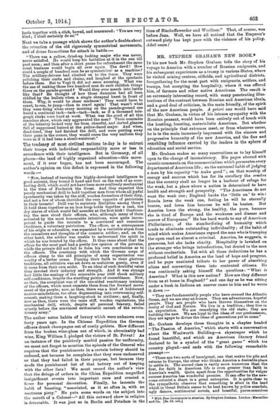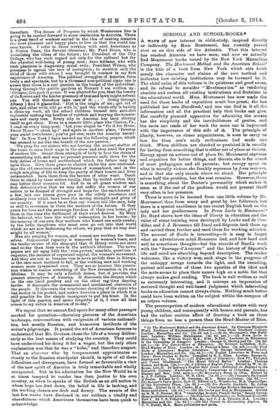MR. STEPHEN GRAHAM'S NEW BOOK.*
IN his new book Mr. Stephen Graham tells the story of his voyage to America with a number of Russian emigrants, and his subsequent experiences as a tramp in various States, where he visited mining centres, oilfields, and agricultural districts. foregathering for the most part with emigrants, settlers, and tramps, but accepting the hospitality, where it was offered him, of farmers and other native Americans. The result is an extremely interesting record, with many penetrating illus- trations of the contrast between Russian and American ideals, and a good deal of criticism, in the main friendly, of the spirit of the new American people. A priori one would have said that Mr. Graham, in virtue of his intense sympathy with the Russian peasant, would have been entirely out of touch with the hustling, boosting, materialistic American. But whether on the principle that extremes meet, or from whatever cause, he is in the main immensely impressed with the sincere and progressive humanity of the new America, and the fine and ennobling influence exerted by the leaders in the sphere of
education and social service.
Mr. Graham makes so many reservations as to lay himself open to the charge of inconsistency. His pages abound with
caustic comments on the commercialism which permeates every department of American life ; on the universal habit of judging a man by his capacity "to make good " ; on that worship of energy and success which has for its corollary the resolve that the country shall no longer be a harbour of refuge for the weak, but a place where a nation is determined to have health and strength and prosperity. "The Americans do not
want the weak one ; England backs the ' little nn' to win Russia loves the weak one, feeling be will be eternally beaten, and loves him because be will be beaten. But America loves the strong, the healthy, the pure, because
she is tired of Europe and the weakness and disease and sorrow of Europeans." He has bard words to say of American Philistinism ; of the standardizing of humanity which tends to eliminate outstanding individuality ; of the habit of
mind which makes Americans regard the man who is tramping the open road as almost a criminal. America, he suggests, is generous, but she lacks charity. Hospitality is lavished on the stranger who brings introductions, but denied to the man without credentials. Yet with all these deductions he has a profound belief in America as the land of hope and progress, and he pays unstinted tribute to her power of absorbing aliens and converting them into contented citizens. He was continually asking himself the questions : "What is America ? What is this new nation? How are they different
from us at home in England P" and one day as he was sitting nnder a bush in Indiana an answer came to him and he wrote it down :—
"They are fundamentally people who have crossed the Atlantic Ocean, and we are stay-at-homes. They are adventurous, hopeful people. They are people who have thrown themselves on the mercy of God and Nature. We live in a tradition ; they live in an expectation. We are remedying the old state ; they are building the new. We are loyal to the ideas of our predecessors; they are agape to divine the ideas of generations yet to come."
Mr. Graham develops these thoughts in a chapter headed
" The Passion of America," which starts with a conversation about the Woolworth Building—a skyscraper which he found beautiful, and which an American literary friend declared to be a symbol of the " great game " which his country played—and ends with the following remarkable passage
"There are two sorts of immigrant, one that makes his pile and returns to Europe, the other who thinks America a desirable place to settle in. The second class is vastly more numerous than the first, for faith in American life is even greater than faith in America's wealth. Quite apart from the opportunities for vulgar success America has wonderful promise. It can offer to the new. come colonist a share in a great enterprise. It is quite clear to the sympathetic observer that something is afoot in the land which in Great Britain seems to be best known by police scandals, ugly dances, sentimental novels, and boastful, purse-conscious
• With Poor Immigrants to Anuorias. By Stephen Graham. London: Macmillan and Co. [8a. 6d. net.]
travellers. The dream of Progress by which Westerners live is going to be carried forward to some realisation in America. There is a great band of workers united' in the idea of making America the most pleasant and happy place to live in that the world has ever known. I refer to those working with such Americans as J. Cotton Dana, the fervent librarian; Mr. Fred Howe, who is visualising the cities of the future; the President of the City College, who has such regard not only for the cultural but for the physical well-being of young men ; Jane Addams, who with such precision is diagnosing social evils ; President Wilson, who promises to uproot the tree of corruption ; to mention only the chief of those with whom I was brought in contact in my first experience of America. The political struggles of America form truly a sad spectacle, but by a thousand non-political signs one is aware that there is a real passion in the breast of the individual. Going through the public gardens at Newark I see written up : Citieens, this park is yours. It was planted for you, that the beauty of its flowers and the tender greenery of tree and lawn might refresh you. You will therefore take care of it. . . .' Going through Albany I find it placarded: Dirt is the origin of sin ; get rid of dirt., and other evils will go with it,' and the whole city is having a clean-up week, all the school children formed into anti-dirt regiments making big bonfires of rubbish and burying the tomato- cans and rusty iron. Every pity in America has been stirring itself to get clean. Even in a remote little place like Clarion, Pa., I read on every lamp-post: 'Let your slogan be "Do it for Home, Sweet Home "—clean up !' and again in another place, Develop your social conscience ; you've got one, make the country beauti- ful.' In New York I have handed me the following prayer, which has seemed to me like the breath of the new passion : We pray for our sisters who are leaving the ancient shelter of the home to earn their wage in the store and shop amid the press of modern life. Grant them strength of body to bear the strain of unremitting toil, and may no present pressure unfit them for the holy duties of home and motherhood which the future may lay upon them. Give them grace to cherish under the new surround- ings the old sweetness and gentleness of womanhood, and in the rough mingling of life to keep the purity of their hearts and lives untarnished. Save them from the terrors of utter want. Teach them to stand by their sisters loyally, that by united action they may better their common lot. And to us all grant wisdom and firm determination that we may not suffer the women of our nation to be drained of strength and hope for the enrichment of a few, lest our homes grow poor in the wifely sweetness and motherly love which have been the saving strength and glory of our country. If it must be so that our women toil like men, help us still to reverence in them the mothers of the future. If they yearn for love and the sovereign freedom of their own home, give them in due time the fulfilment of their sweet desires. By Mary the beloved, who bore the world's redemption in her bosom; by the memory of our own dear mothers who kissed our souls awake; by the little daughters who must soon go out into that world which we are now fashioning for others, we pray that we may deal aright by all women.' Men are praying for women, and women are working for them- selves. Commercial rapacity is tempered by women's tears, and the tender stories of the shop-girl that 0. Henry wrote are more read to-day than they were in the author's lifetime. The news- papers are all agog with the • vice-probes,' scandals, questions of eugenics, the menace of organised capital, the woman's movement. And they are not so because vice is more prolific than in Europe, or the race more inclined to fail, or the working men and working women more tyrannised over. They are so because this genera- tion wishes to realise something of the New Jerusalem in its own lifetime. It may be only a foolish dream, but it provides the present atmosphere of America. It discounts the despair which on the one hand prudery and on the other rag-time dancing invite. It discounts the commercial and mechanical obsession of the people. It discounts the wearisome shouting of the cynic who has money in his pocket, and makes America a place in which it is still possible for the simple immigrant to put his trust. In the light of this passion, and never forgetful of it., I view all that comes to my notice in America of to-day."
We regret that we cannot find space for many other passages marked for quotation—charming pictures of the American landscape, conversations with emigrants of various nationali- ties, but mostly Russian, and humorous incidents of the writer's pilgrimage. It passed the wit of American farmers to understand that Mr. Graham chose the life of a tramp deliber- ately as the best means of studying the country. They could have understood his doing it for a wager, but the only other explanation was that he was a "hobo," and therefore suspect. That an observer who by temperament approximates so closely to the Russian standpoint should, in spite of all these difficulties and divergences, have formed so favourable a view of the new spirit of America is truly remarkable and wholly unexpected. But in his admiration for the New World he is at times tempted to render less than justice to his own country, as when be speaks of the British as an old nation in whom hope has died down, the belief in life is lacking, and the working classes are drab and dreary. The events of the last few weeks have disclosed in our soldiers a vitality and cheerfulness which Americans themselves have been quick to acknowledge.











































 Previous page
Previous page